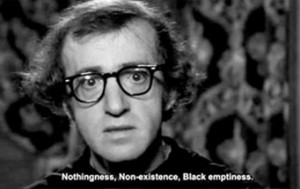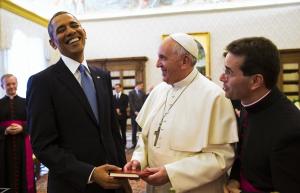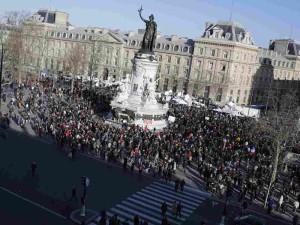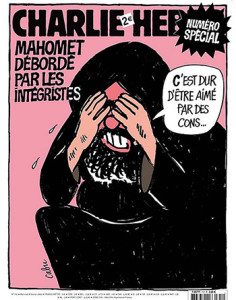 Cross-posted on the Corner.
Cross-posted on the Corner.
A writer for the Guardian, on cue (my emphasis added):
We are in perilous territory. Slaughter as political protest cannot be defended. Free speech as legal and moral pre-requisites in a free society must be defended. But there are also other obligations to be laid upon those who wish to live in peaceful, reasonably harmonious societies. Even after Paris, even after Denmark we must guard against the understandable temptation to be provocative in the publication of these cartoons if the sole objective is to establish that we can do so. With rights to free speech come responsibilities.
Ah yes.
“Responsibilities.”
After the uproar that followed the appearance of the original Mohammed cartoons, an article was published in Jyllands-Posten (the newspaper that first published those cartoons) included this phrase: “Ytringsfrihed er ytringsfrihed er ytringsfrihed. Der er intet men.”
The translation? “Free speech is free speech is free speech. There is no but.”
But there is.
As I noted the other day, Jyllands-Posten is singing a different tune these days, made all the bleaker by its bluntness. The newspaper declined to republish the Charlie Hebdo cartoons after the Paris murders saying this:
“We have lived with the fear of a terrorist attack for nine years, and yes, that is the explanation why we do not reprint the cartoons, whether it be our own or Charlie Hebdo’s,” Jyllands-Posten said. “We are also aware that we therefore bow to violence and intimidation.”
In writing about the (first) Copenhagen murder last night, I linked to a 2010 Philadelphia Inquirer story that revealed how a number of the meetings due to be addressed by Lars Vilks (the artist whose event was attacked) had been canceled.
If I had to guess, I suspect that those who, however sadly, canceled those events, are today feeling, however sadly, that they did the right thing. Violence works.
There will be many more cancellations, many more invitations that go unissued, many more articles that do not get written, and many more cartoons that do not get drawn.
The noose tightens a bit more.
In a piece published by The Spectator before Copenhagen, Douglas Murray writes about a rally held in London a week or so ago:
Yesterday in London a crowd of more than a thousand British Muslims (carefully divided between males and females) gathered outside Downing Street. The rally – organised by something calling itself ‘The Muslim Action Forum’ – was a protest against freedom of speech, specifically to cartoons of Mohammed in the French publication Charlie Hebdo. Among the banners carried by protestors were ones that read, ‘I am a servant of holy prophet Muhammad (pbuh)’, the sinister ‘We love prophet Muhammad (pbuh) more than our lives’, ‘Jesus and Moses were prophets of Islam’ and the even more presumptuous ‘Learn some manners’. Among those holding a banner reading ‘Charlie and the abuse factory’ was a little boy. Others bore banners with the fantastically awful words spoken by the Pope last month: ‘Insult my mum and I will punch you (Pope Francis).’ A large banner hung beneath the stage from which speakers addressed the crowd carried the barely concealed threat: ‘Be careful with Muhammad.’
Meanwhile a group of tribal leaders presented a petition to Number 10 Downing Street which they said had been signed by 100,000 UK Muslims criticising publications which ‘sow the seeds of hatred’…. Among the speakers was one Shaykh Tauqir Ishaw, a spokesman for the organisers who said:
‘Perpetual mistakes by extremists, either by cold-blooded killers or uncivilised expressionists, cannot be the way forward for a civilised society. The peace-loving majority of people must become vociferous in promoting global civility and responsible debate. At this time of heightened tension and emotion, it is crucial that both sides show restraint to prevent further incidents of this nature occurring.’
“Restraint.” “Responsibilities.” “But.”
Murray:
Of course much though these fanatics may like to pretend otherwise there are no ‘two sides’ of the same coin going on here. The ‘expressionists’ and the ‘terrorists’ are not ‘as bad as each other’. The only two things which are in fact conjoined are the people who use guns and bombs to terrorise people for exercising their rights as free Europeans and the very large number of people from the ‘moderate majority’ who back up such violence (even while, like yesterday’s speakers, claiming to deplore it) with warnings that non-Muslims should be ‘careful’ when addressing their religion.
Quite.









